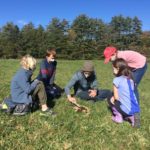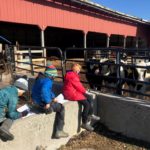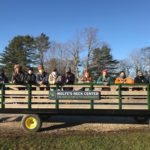COVID and Curriculum: Schools Collaborate with Camps, Outdoors Educators to Take Learning Outside
The Wonders of Wolfe’s Neck Farm
“Who doesn’t love collecting eggs and going in with the cows?”
Andrew Lombardi, public programs manager at Wolfe’s Neck Farm in Freeport, sees local schoolchildren’s exuberance for learning outdoors firsthand. “Animal husbandry is most popular,” he says. “The stuff with the critters.”
At Wolfe’s Neck Farm this fall, about 200 children from three RSU 5 schools are learning about those critters, among many other topics, in an outdoor learning collaboration designed to help meet the challenges of the COVID-19 pandemic.
The five-week program, which concludes on Dec. 18, serves students from Freeport’s Mast Landing and Morse Street schools, along with Durham Community School. With a total of about 200 students – divided into two cohorts which attend on different days – the farm is host to about 50 students in grades K-5 each morning and each afternoon.
The farm, whose 2020 summer camps sessions were suspended, is well-positioned to provide the programming. “It’s great to work with the public schools,” Lombardi said. “We are a nonprofit public resource, and we have the ability to be creative and flexible within the organization.”
RSU 5 administrators collaborated with Wolfe’s Neck Farm’s Senior Director of Programs Joe Grady. With the support of CARES Act funding, they were able to offer youngsters the opportunity to learn, alongside their friends and classmates, about topics far removed from the typical indoor classroom. Superintendents Becky Foley and Cynthia Alexander said the vast majority of parents took advantage of the program.

Each group of 50 is divided into 10-student teams, each of which is immersed in five different areas of study, one per week. And while Lombardi said animal husbandry may be the fan favorite, all five topics expose students to the farm’s expansive learning environments. Plant food production, woods and water ecology, research, and outdoor living skills may have some overlap, he said, yet each provides a distinct curriculum taught by a total of 10 experienced outdoor educators.
For example, Lombardi said fifth grade students’ research activities include “a lot on cow stomachs,” including a project focused the animals’ methane emissions. Students of all ages spend time in the low tidal zones, in the farm’s woods, and, of course, on the farmland itself. Tractor rides to reach that property are another high point, Lombardi said. Students have also learned fire building, a prized outdoor living skill.
Groups range somewhat by age, he said, and include only students from the same schools. Students undergo daily screenings and always wear masks.
The entire program is held outdoors. Five bell-style tents, equipped with heaters and doors open to fresh air, provide a space for a quick warm-up. Educators can also utilize greenhouses and barn overhangs during brief moments inclement weather, Lombardi said.
“The feedback has been great, particularly from the adults in the community,” he said. Youngsters have been able to be with friends, outdoors, “and the other style of programming is great.”
In addition, the weather has cooperated, Lombardi said. Heavy rain canceled just one full and one-half day of programming. “It’s helpful to have snow. The little kids are all bundled up and weatherproof.”

“The biggest challenge is making sure everyone is warm and comfy,” he said. Indeed, the farm has an ample supply of winter gear to ensure everyone is properly clothed.
Lombardi credits Molly Cyr, Wolfe’s Neck farm camp manager who is currently on medical leave, with the insights leading to this program. And while COVID presents ever-changing challenges to educators, “we have a really creative staff,” Lombardi said. “There’s no playbook,” yet the team is able to address problems that may arise and “figure them out.”
In addition to the on-site educators, other Wolfe’s Neck employees have also pitched in, Lombardi said. “We have the camaraderie of a small nonprofit staff.”
Wolfe’s Neck offered such a community program this past fall, prior to RSU5’s collaboration.
“Summer was so weird, with no camp,” Lombardi said. “Having kids zooming around makes it feel like regular Wolfe’s Neck.” And to be sure, this sort of “zooming” is likely a welcome departure from schools’ other “Zoom” activities.
The pandemic has also heightened awareness around the value of outdoor education, he added. “People have been beating that drum for a long time, often on deaf ears.” Now, projects like Wolfe’s Neck’s have “shined a light on the value of it.”

Administrators from RSU 5 said in an email that the initiative stemmed from their desire to extend students’ opportunities for in-person learning amidst the challenge of achieving DOE social distancing recommendations in school classrooms.
“Because we have previously taken field trips to Wolfe’s Neck Farm, we decided to reach out to them to see if they were interested,” said Superintendent Becky Foley and Assistant Superintendent Cynthia Alexander. “They were immediately interested in exploring this idea.”
But although parents, teachers, and administrators – as well as “joyful and engaged” children – give the program high marks, the current funding situation will demand conclusion of the program at the holiday break. Foley and Alexander said. The CARES Act relief ends on Dec. 30, and administrators said they see “no indication of further available funding.”
Nonetheless, RSU 5 includes “more student-centered learning and community partnership,” in its strategic action steps, said Foley and Alexander. “It would probably look a little differently, but we would love to have this initiative continue in some manner in the future.”
Lombardi is on board. “We’d love to work with school again,” he said. “Even if it’s not RSU 5 in the spring, we’d still like to run something for our community.”
School Outreach at the UMaine System’s Bryant Pond 4-H Camp and Learning Center
Another youth camp forced to suspend its 2020 season also pivoted to provide schoolchildren with alternative learning opportunities. Bryant Pond 4-H Camp and Learning Center this fall offered programming for dozens of students from both SAD 17 and SAD 44.
Bryant Pond is already heralded for its collaboration with schools. It hosts the Telstar Freshman Academy, in which Telstar High School freshmen are based at the Bryant Pond campus for the full year, participating in experiential education activities integrated with more traditional coursework. But the center broadened its reach even further this fall, helping local schools navigate COVID-related educational hurdles.
Director Ron Fournier says that over a course of nine weeks, half-day programming held Monday through Friday served regional students in grades K through 9. Programs were assigned to different parts of the campus, with different grade levels coming on different days. Schools in South Paris, West Paris, Otisfield, and Harrison all sent youngsters in this grant-funded initiative.
Fournier and other Bryant Pond educators immersed students in a broad range of learning activities that maximized the camp’s outdoor resources. Topics included ecology, wilderness survival, geology, forest ecology, S.T.E.M., teambuilding, nature awareness, hiking, wildlife, and natural history.
The project had its basis in the organization’s value in, and support for, its community, he said. “We met with teachers and set goals.”
“The feedback was great,” he said. “We had outstanding groups, and everyone really appreciated being outdoors.”
Suspending Bryant Pond’s 2020 camp programs had vast financial ramifications, Fournier said, but handling the effects of the pandemic is “all about how we think.”
“We can let it beat us,” he said. But the center’s approach was far more positive, he said, by asking: “How are we going to meet the challenge?”
Meeting that challenge for educators statewide has demanded resources, cooperation, and commitment to community. Wolfe’s Neck Farm and Bryant Pond 4-H Camp and Learning Center represent just two examples of how schools’ collaboration with the local organizations – connected through their shared mission to youth education and development – are helping to contribute new learning opportunities as a bright spot in this uncertain public health crisis.
Teambuilding, appreciating and understanding the environment, building wilderness living skills. These are just a fraction of what Maine youth camps teach youngsters each summer. Now, with collaboration among these organizations and their local schools, the spirit and import of outdoor education is resonating even further.